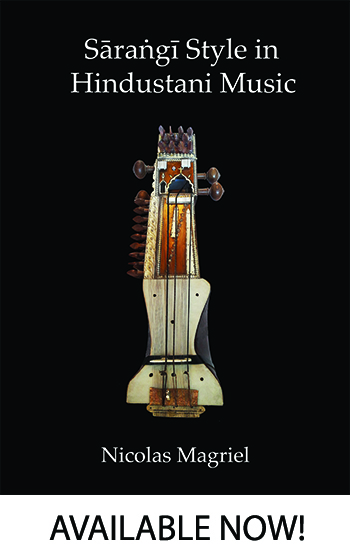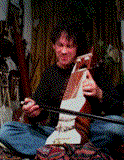
Ustad Sultan Khan (1941-2011), one of the greatest sarangi players of the last century, was the son and student of Gulab Khan of Jodhpur, originally from Sikar in Northern Rajasthan. Sultan Khan also learned from his uncle, the famous sarangi player, Azim Khan. His style owed a lot to the gayaki of Ustad Amir Khan. This can be heard in his wide gamaks and circular approaches to notes and in the leisurely development of his barhat in vilambit khayal. His style also had a lot in common with other Sikar-gharana sarangi players—a thick vocal tone achieved by very high placement of the strings, so that they are stopped exclusively with the skin above the nails and not with the nails of the left hand. The Sikkar style relies on robust arm movements with a minimum of finger-exploitation.
Sultan Khan had a jovial personality. We were good friends for several years. Whenever he used to come to London, he would phone, and I would visit him wherever he was staying, taking my sarangi, and I would play along with him informally. At this time, in the eighties, I was "recovering" from intensive training in India during the seventies, and I wasn't very ambitious about learning more sarangi. I offered outings, but he was not interested in seeing Buckingham Palace or anything else that London had to offer visitors. So we just practised. He was modest and quiet.
Then one day I was overwhelmed with love and respect at a private concert of his at some NRI's house out near Heathrow Airport. I told him I wanted to formally become his shagird (disciple). This was a big mistake. First of all he explained that in order to do the ganda bandhan initiation ceremony, in his tradition some offering of gold is necessary. I've never heard of this particular custom elsewhere. It seems his wife's thirst for riches was partially responsible for the change in mood around this time. They were staying in Romford, an Eastern suburb of London, and I bundled them both (600 pounds plus) into the car and drove them off to an Indian jewellar's in Southall, a distant Western suburb of London, where Sultan Khan and his missus selected an enormous and very ostentacious gold ring, and we drove back to Romford. In the leadup to the elaborate ganda bandhan ceremony I had one wonderful lesson. Then we did the ceremony, and instantly Sultan Khan stopped being my friend and stopped being open with his music. He lorded it over me in various ways. Making successive appointments and breaking them—it was roughly a two-hour drive to where he was staying. I would arrive only to be told that he'd gone out somewhere or other. Well it seems that suddenly he decided that I needed to be taught a lesson. But I'd had my fill of bullshit from gurus. It had been romantic and heroic and a bit mystical—touching people's feet and hoping for some teaching, practising like crazy, and going to the market for whatever they desired, vegetables, booze, dope whatever. But I wasn't about to engage in another one of these essentially infantile relationships. So my time as a disciple of Sultan Khan was short-lived.
One consolation was that I heard from a third party that when Zakir Hussain, the world's greatest tabla player, next met Sultan Khan, he laughed and said "hey man where's you get that ugly ring?" Anyway he was a good man and a great sarangiya. May he rest in peace with a heavy and tuneful gamak.
This video is of a portion of my one lesson with Khan Saheb after the ganda bandhan ceremony. Mick Ripsher accompanies on tabla. Rag Marva in Romford, Essex. We begin with Amir Khan's famous vilambit composition "piya anata des gailava" (my love has gone away). This is followed by "guru bina gyan na pao" (without the guru, knowledge is not possible), well chosen for the event.
>
I are very grateful to Daniel Neuman for his film of Sultan Khan at the Bhopal Sarangi Mela of 1989. It was pretty early in the morning, and the Ustad looked bleary and considerably worse for wear, but his playing, inspired by the audience of 100 sarangi players, was intense and masterful. He played rag Nat Bhairav followed by a Rajasthani lullaby in Desh which he also sang.
SULTAN KHAN AUDIO
(April 1, 2015) Here are some jewels of the maestro's sarangi playing and also some of his sleepy singing. It is incredible to see that audio cassettes that are more than forty years old are still playing nicely—when digital media of all sorts degenerate more quicky. So we have some lovely examples of Sultan Khan's playing from the 1960s when he was known as Sultan Ali Khan, was jolly and humble and had henna-red hair. I first met him in a seedy hotel by the Jama Masjid in Old Delhi. There are also recordings from a UK concert in 1992, during which he sang a Lori and a Rajasthani folk song. The Durga is magnificent.



